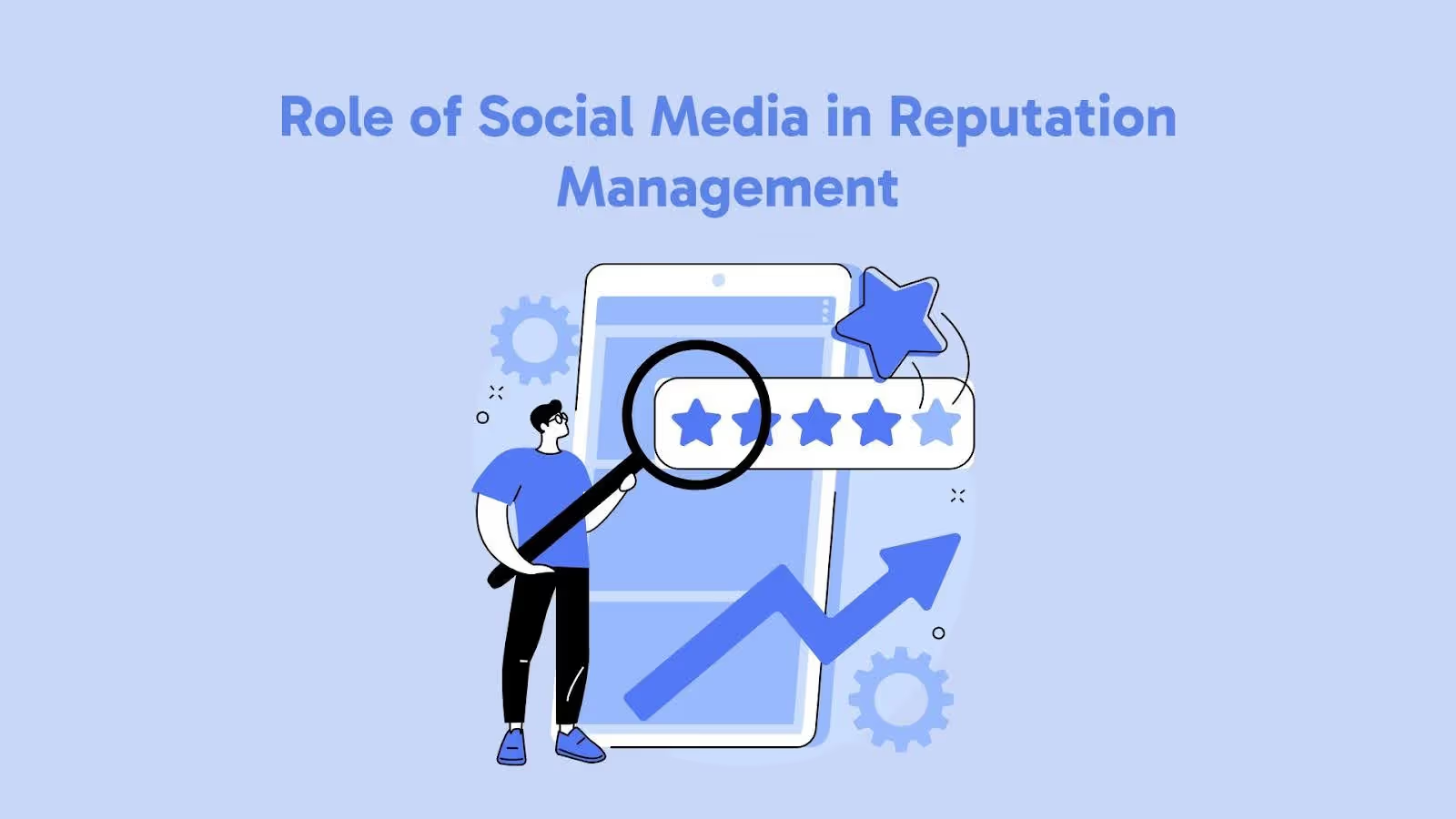We've all seen the impact a single negative comment or review can have on a brand. One tweet can become a PR nightmare, and one bad review can drive potential customers away. In today's world, your brand's reputation is more vulnerable than ever, and social media is where everything unfolds ‘good and bad’.
If businesses aren't actively managing their reputation online, they risk losing control of the narrative. The problem is that many companies don't realize how much influence their social media presence has until it's too late.
This blog will explore why social media reputation management is crucial and provide practical strategies to help you navigate the noise and build a strong, positive online image.
What Is Social Media Reputation Management?
Social media reputation management is about understanding and managing how your brand is seen on platforms like Facebook, Instagram, and X (formerly Twitter). It means keeping track of conversations, responding thoughtfully to feedback, and sharing content that aligns with your brand's image.
In a digital world where opinions spread fast, managing your social media and reputation is more important than ever. Negative comments or misinformation can gain traction quickly, making it essential to stay involved and responsive. You can maintain a strong, positive presence by engaging with your audience and addressing feedback.
To do this well, it's essential to focus on the basics. Let's look at the 4 elements of social media reputation management and how they help brands navigate today's online market.
4 Key Elements of Social Media Reputation Management
- Monitoring and Listening: Social media reputation monitoring helps you stay on top of what’s being said about your brand, allowing you to address issues and spot trends early. Tools designed for social media online reputation management streamline this process, making it more efficient.
- Engagement: Actively engaging with your audience shows that you value feedback. Responding thoughtfully to both positive and negative comments helps build trust and turn critics into advocates.
- Content Strategy: Authentic, meaningful content is key to shaping public perception. Share posts that reflect your brand’s values and connect with your audience, whether through customer stories or educational content.
- Crisis Management: Having a crisis plan in place is crucial. Address issues swiftly and transparently to minimize damage and demonstrate your brand’s commitment to accountability.
Now that we’ve explored what social media reputation management really means, the next thing to think about is—is it something your business should prioritize? In today’s digital world, how you’re perceived online can make or break your brand, so it’s worth considering how it fits into your overall strategy.
Is Social Media Reputation Management a Priority for Your Business?
Social media reputation management is critical as positive word-of-mouth drives brand awareness, with 68% of consumers following brands for updates and recommendations. Platforms like Yelp, G2, and Trustpilot amplify these conversations, where authentic positive and negative feedback can shape customer perceptions.
Actively engaging with reviews and maintaining a consistent presence helps ensure your brand remains trustworthy and credible. Here are some key considerations to prioritize your social media reputation management efforts.
1. Influences Consumer Decisions
Online reviews and social media comments directly shape public perception. Positive feedback attracts customers, while negative reviews can push them away. Social media reputation monitoring allows businesses to address concerns quickly, keeping their reputation proactive.
2. Builds Trust and Credibility
Transparency fosters trust. Responding to both positive and negative feedback shows customers that their opinions matter, building loyalty and credibility. Social media and review management help maintain trust over time.
3. Improves Visibility
A strong reputation management strategy improves visibility. Encouraging positive reviews and creating shareable content ensures favorable narratives rise in search rankings, amplifying your brand’s presence.
4. Handles Crises Effectively
Social media can quickly amplify negative news. With a solid social media online reputation management plan, businesses can respond rapidly to minimize damage and even turn a crisis into a chance to strengthen their reputation.
5. Gathers Insights and Feedback
Monitoring discussions offers more than damage control, it provides valuable insights. Social media reputation monitoring helps businesses understand what customers like, dislike, and the trends they follow, refining products and strategy.
6. Supports Marketing Efforts
A strong online reputation improves marketing efforts. Positive reviews and word-of-mouth on social platforms influence consumer behavior, making them key in aligning with best practices for social media reputation management.
7. Attracts Talent and Investors
Your online reputation matters beyond customers. Potential employees and investors research brands online, and a solid reputation can help attract top talent and secure valuable partnerships.
8. Reduces Legal and Financial Risks
Ignoring harmful content can lead to legal and financial risks. Proactive social media reputation management allows businesses to address damaging reviews or misinformation before they escalate.
Making social media reputation management a priority isn't just a good practice, it's necessary for businesses looking to thrive in a competitive space. From influencing consumer decisions to building trust, it impacts every aspect of how your brand is perceived. But what happens if you choose to overlook it? Let's examine the risks of overlooking your social media reputation and how they can impact your brand's growth.
The High Cost of Ignoring Your Social Media Reputation
Neglecting social media reputation management can have lasting consequences for your brand. With consumers relying heavily on social media and reviews to make decisions, even minor issues can quickly escalate if left unchecked. Businesses that fail to monitor and manage their reputation risk losing trust, credibility, and loyal customers.
Understanding the risks of inaction can highlight why social media reputation management is essential for brands, and how minor oversights can lead to more significant challenges.
Let's dive into the potential pitfalls and why an active approach makes all the difference.
- Eroded Trust: Neglecting social media reputation management can quickly damage trust. When brands don’t engage with or address feedback, it creates a perception of indifference, affecting how customers view your brand.
- Accumulating Negative Feedback: Unresolved complaints or negative reviews can snowball, gradually eroding credibility. Proactive social media reputation monitoring helps address these issues before they escalate.
- Declining Sales: A bad reputation drives potential customers to competitors. Studies show that 92.4% of consumers rely on online reviews, so managing your social media reputation is key to attracting and retaining customers.
- Lengthy Recovery: Once trust is damaged, rebuilding it is difficult and time-consuming. Without a solid reputation management strategy, brands can find themselves stuck in damage control, which can be costly and draining.
Ignoring your social media reputation can come with significant consequences, from lost customers to damaged trust. So, how can you avoid these pitfalls? That’s where a solid social media reputation management strategy comes in, helping you take control of your brand’s online presence and steer it in the right direction.
You won't want to miss this read: The Power of AI in Sales and Marketing Strategy
Social Media Reputation Management Strategy
A clear social media reputation management strategy is vital for effectively shaping public perception and addressing feedback. It ensures your brand stays proactive, resolving issues before they escalate and building trust across platforms like Facebook and Instagram.
Without a strategy, businesses risk losing control of their reputation, reacting to problems instead of preventing them. You can strengthen customer relationships and protect your brand's credibility by focusing on monitoring, engagement, and transparency.
Here's how to create an actionable plan that ensures consistent and effective reputation management on social media.
Step 1: Assess Your Current Reputation
Start with social media reputation monitoring to understand what's being said about your brand. Analyze reviews, social media mentions, and customer feedback. Use alerts and monitoring tools to track sentiment and identify recurring themes.
Step 2: Define Your Brand's Image
Establish how you want your brand to be perceived. Outline core values and key messages that reflect your brand identity. Clear communication helps align your social media and reputation goals with customer expectations.
Step 3: Focus on the Right Platforms
Not every platform will suit your brand. Choose social media channels that align with your audience and focus your efforts there. Consider where competitors are active to refine your reputation management on social media.
Step 4: Develop an Engaging Content Strategy
Plan content that resonates with your audience and highlights your brand's strengths. Include testimonials, visuals, and value-driven posts. Consistency in style and messaging strengthens brand reputation management and social media efforts.
Step 5: Actively Engage with Your Audience
Engage in conversations by promptly responding to comments and feedback. Address negative reviews with professionalism and positive ones with gratitude. Engagement builds trust and shows why social media reputation is essential for brands.
Step 6: Use Monitoring Tools
Use monitoring tools like Nurix AI to track mentions, analyze sentiment, and monitor real-time trends. AI-driven tools streamline this process, helping businesses respond efficiently and refine their social media reputation management strategy.
Step 7: Encourage Positive Reviews
Ask satisfied customers to leave reviews on platforms like Yelp or Google. Positive feedback improves credibility and counters any negative impressions. This is one of the best practices for social media reputation management.
Step 8: Create a Social Media Policy
Set clear guidelines for how your team interacts online. Include protocols for handling negative comments and maintaining consistency in tone and professionalism. A solid policy supports brand reputation management on social media.
Step 9: Prepare for Crises
Develop a crisis management plan to handle potential PR issues. Identify risks, designate a response team, and outline effective communication strategies during challenging situations.
Step 10: Regularly Review and Adjust Your Strategy
Social media and review management is an ongoing process. Analyze engagement, sentiment, and feedback metrics to refine your strategy and adapt to changing customer needs.
Now that you have a solid social media reputation management strategy in place, it’s important to know what works and what doesn’t. Let’s dive into the dos and don’ts of social media reputation management, so you can make the most of your efforts and avoid common mistakes.
You’ll find this helpful too: Performing Social Media Sentiment Analysis: Challenges and Future Trends
Dos and Don'ts of Social Media Reputation Management
Managing your social media reputation isn't just about being active, it's about knowing how to engage effectively. Every response, post, or interaction shapes how your audience perceives your brand, making it essential to focus on what works and avoid what doesn't.
Balancing best practices with common pitfalls is crucial to maintain trust and credibility. Let's look at the key actions to take and steer clear of, for successful reputation management on social media.
Once you’ve mastered the dos and don’ts of social media reputation management, the next step is figuring out where to focus your energy. Not all platforms will give you the same impact—so, let’s take a look at the social media platforms to prioritize in 2025 to maximize your efforts.
Proactively manage your reputation with Nurix AI’s 24/7 AI support monitoring social channels for you. Find out more!
Social Media Platforms to Prioritize in 2025
The success of social media reputation management lies in focusing on platforms that align with your audience and goals. For example, Instagram excels at visual storytelling, LinkedIn fosters professional connections, and TikTok reaches younger, trend-driven audiences. Each platform serves a unique purpose, making it essential to choose those that best suit your brand.
Here’s how to identify and prioritize the platforms that will impact your reputation management on social media in 2025.
1. Facebook
- Why It Stands Out: Facebook remains a leader in brand reputation management and social media efforts due to its extensive user demographics and advanced ad targeting. Its group functionality helps build loyal communities while offering brands direct engagement with their audience.
- Why It Matters: Facebook's detailed ad tools and community features make it invaluable for reputation management on social media, helping businesses connect with new customers and nurture existing relationships.
2. Instagram
- Why It Stands Out: Known for its visual storytelling, Instagram combines shopping tools, Stories, and Reels to create an interactive platform. Its high engagement rate makes it ideal for showcasing products creatively.
- Why It Matters: For businesses focusing on social media online reputation management, Instagram's shopping capabilities and creative potential allow brands to foster connections while driving sales.
3. TikTok
- Why It Stands Out: TikTok's algorithm levels the playing field, allowing brands to go viral regardless of follower count. Trends and user-generated content offer unparalleled opportunities for creativity.
- Why It Matters: TikTok is perfect for brands that engage younger audiences with authentic, entertaining campaigns, a key element of modern social media reputation management strategies.
4. YouTube
- Why It Stands Out: With its long-form video format, YouTube is ideal for brands looking to educate, entertain, or establish authority. Its searchability ensures content remains relevant over time.
- Why It Matters: For businesses using video to improve brand reputation management and social media efforts, YouTube provides a platform for detailed storytelling and audience engagement.
5. LinkedIn
- Why It Stands Out: LinkedIn is a professional networking hub that helps brands connect with industry leaders and share thought leadership content.
- Why It Matters: For B2B companies, LinkedIn is a cornerstone of reputation management social media strategies, enabling meaningful connections and professional credibility.
6. Threads
- Why It Stands Out: Threads focuses on text-based communication while using Instagram's user base. Its real-time engagement features make it ideal for immediate audience interactions.
- Why It Matters: As part of Meta's ecosystem, Threads offers a promising space for social media reputation monitoring and timely updates, making it great for fostering open dialogue with followers.
7. Pinterest
- Why It Stands Out: Pinterest excels at driving traffic through visually appealing, inspirational content. Its integrated shopping features make it ideal for lifestyle-focused brands.
- Why It Matters: For brands in creative niches, Pinterest supports best practices for social media reputation management by combining inspiration with action, leading to increased conversions.
8. Reddit
- Why It Stands Out: Reddit provides authentic conversations within niche communities organized by topics in Subreddits, AMAs (Ask Me Anything) offer unique engagement opportunities.
- Why It Matters: By engaging in relevant discussions, brands can build trust and credibility, making Reddit an essential part of social media online reputation efforts.
As you decide which social media platforms to prioritize in 2025, it’s also crucial to understand how to track your efforts effectively. Social media monitoring and listening play key roles in that. So, what’s the difference between the two, and why does it matter for your strategy? Let’s break it down.
This might catch your interest: Predictive AI in Sales Forecasting: An Overview
Social Media Monitoring and Listening: What's the Difference?
Social media monitoring and listening serve different but complementary purposes in social media reputation management. Monitoring focuses on real-time tracking of mentions, comments, and reviews, while listening goes deeper by analyzing overall sentiment and uncovering trends. Together, they ensure your brand stays responsive and aligned with audience expectations.
Both practices are essential for maintaining trust and credibility. Monitoring addresses immediate feedback, while listening helps refine long-term strategies. Here's how they differ:
Now that we've cleared up the difference between social media monitoring and listening, it's time to explore how you can take your reputation management to the next level. Using AI can help you stay ahead of potential issues and even improve your brand’s image. Let’s dive into how AI can play a powerful role in positive social media reputation management.
Using AI for Positive Social Media Reputation Management
AI is revolutionizing social media reputation management by automating tasks like tracking mentions, analyzing sentiment, and identifying trends. This makes managing your brand's reputation faster and more efficient.
With AI, businesses can respond quickly to feedback, address issues early, and make data-driven decisions to strengthen their social media presence. Let's look at how AI can improve your approach to reputation management on social media.
- Sentiment Analysis: AI can quickly assess the tone of social media interactions, helping brands understand customer emotions. Businesses can prioritize responses by analyzing feedback, ensuring they address concerns or celebrate positive sentiment at the right time.
- Predictive Analytics: Using past data, AI helps predict potential reputation crises before they escalate. This proactive approach allows brands to prepare responses and minimize negative impact, improving overall social media reputation management.
- Automated Reporting: AI-powered tools automatically compile brand mentions, sentiment analysis, and engagement metrics, saving time and keeping teams updated without manually analyzing data. This streamlines social media reputation monitoring efforts.
- Trend Identification: AI identifies emerging trends in consumer behavior and industry discussions, allowing brands to join relevant conversations and stay ahead of the curve. This improves social media reputation by showing that your brand is active and engaged with its audience.
- Crisis Management Integration: AI integrates data from social media, reviews, and news articles into one easy-to-use interface, providing a comprehensive view during crises. This helps teams respond quickly with the correct information, reducing the damage to brand reputation management on social media.
- Chatbot Integration: AI-powered chatbots can instantly respond to common inquiries and complaints on social media, improving customer satisfaction and freeing up human resources for more complex issues. This improves the customer experience and helps maintain a positive online reputation.
Conclusion
Your brand's reputation is built over time, and with social media, it's constantly evolving. It's easy to get caught up in the hustle and forget how powerful your online presence can shape public perception.
But with the right approach to social media reputation management, you can turn every interaction into an opportunity to build trust, foster loyalty, and showcase what your brand truly stands for. The key is consistency and being genuine in how you engage with your audience.
So, as you move forward, think of your online reputation as something you nurture daily, and watch how it becomes one of your brand's greatest strengths.
Harness AI insights to track brand sentiment and identify trends before they become issues with Nurix AI
- Instant customer engagement with intelligent AI agents.
- Automate repetitive tasks, freeing agents for high-value work.
- Resolve queries 36% faster with real-time AI support.
- 24/7 omnichannel service without added operational costs.
- Cut costs by 60%, boosting overall efficiency.
- Maximize agent productivity by letting AI handle routine queries.
Keep your brand's reputation strong with AI-driven social engagement and real-time sentiment management. Get in touch with us!
FAQs About Social Media Reputation Management
1. What is social media reputation management?
It's the process of monitoring and shaping how your brand is perceived on social media platforms.
2. Why is social media reputation management important?
It helps build trust, manage customer relationships, and address negative feedback effectively.
3. How can I improve my brand's reputation on social media?
Be proactive by monitoring mentions, responding promptly to feedback, and sharing positive content.
4. What tools can help with social media reputation management?
Tools like Nurix AI can monitor and analyze sentiment, and manage customer engagement across platforms.
5. How should I respond to negative comments online?
Address concerns quickly and professionally, and consider moving detailed discussions offline to resolve issues.









